|
|
|
Sort Order |
|
|
|
Items / Page
|
|
|
|
|
|
|
| Srl | Item |
| 1 |
ID:
139127
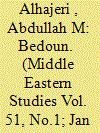

|
|
|
|
|
| Summary/Abstract |
The Bedoun (stateless/without nationality) in Kuwait constitute a controversial concurrent social, political and legal issue, which was and still is the subject of heated political debate, a vivid example of social conflict, and a platform of extensive legal deliberation concerning its thorny dimensions. The problem of Bedoun is not only politically and socially complex, but it has its problematic legal dimensions, which have made it, since the 1950s, a complex and chronic problem. The recent growing interest in addressing the issue and the extensive strife to determine its degree of complexity and entanglement could be ascribed to the margin of freedom enjoyed in Kuwait more than the rest of the Arabian Gulf states, since active social and political participation constitute the pillars of the democratic system in Kuwait, in light of the growing political and media freedoms and the focus on the Bedoun as a marginalized community legally, politically and socially. Therefore, the current problem ofBedoun constitutes the strongest internal concern for the Kuwaiti authorities and people after the external threats, especially because it has always been ignored or treated as a security issue at times. This study seeks to shed light on the issue of Bedoun to decipher its causes and its historical development until it became a pressing issue at government and community levels in the State of Kuwait. The study will avoid the complex legal and social complexities of the issue.
|
|
|
|
|
|
|
|
|
|
|
|
|
|
|
|
| 2 |
ID:
139133
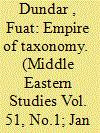

|
|
|
|
|
| Summary/Abstract |
This article examines how the Ottoman Empire through pre-modern surveys (tahrir) and censuses, counted, categorized and classified their population according to ethnic and religious identities, and how the social, economic and political transformation impacted on the change of taxonomy (nomenclature, classification and hierarchization) over time. Through this long trajectory, from the imperial system to the modern state system, the Ottoman government increased its power over its ‘population’, and, simultaneously, its taxonomic power.
|
|
|
|
|
|
|
|
|
|
|
|
|
|
|
|
| 3 |
ID:
139130


|
|
|
|
|
| Summary/Abstract |
The Great Iraqi Revolution of 1920 was actually a series of local, mostly Shi‘ite, uprisings against the British forces which had occupied Iraq during the First World War. Even though it was squashed by the British, it has been established since then in the Iraqi collective memory as a war of independence and a formative event of Iraqi nationalism, symbolizing the unity of the Iraqi people, their solidarity and patriotic spirit. This article tries to show how the Great Iraqi Revolution was commemorated and remembered through time in order to provide better understanding about how Iraqis see themselves and their past.
|
|
|
|
|
|
|
|
|
|
|
|
|
|
|
|
| 4 |
ID:
139129
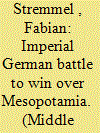

|
|
|
|
|
| Summary/Abstract |
This article investigates the German cultural diplomatic efforts in the Ottoman Empire between 1900 and 1918 and the example of the German so-called Propagandaschule in Baghdad. The article argues that contrary to recent scholarship, the German Empire had a considerable and well-designed secular-based cultural diplomacy programme, especially in the Ottoman Empire. This finding is important for the social history of the Arab provinces of the late Ottoman Empire, as it gives the local population, especially the Muslim part, a much stronger agency in daily life than recently argued. The finding breaks with the assumption that the local population only had the Ottoman state schools or western missionary schools to choose from. The Muslim population in particular favoured the possibility of secular education.
|
|
|
|
|
|
|
|
|
|
|
|
|
|
|
|
| 5 |
ID:
139131


|
|
|
|
|
| Summary/Abstract |
The renowned Egyptian journalist and commentator Mohamed Hassanein Heikal (b. 1923) is arguably the doyen of Arab writers critical of the United States. Heikal's career as an author spans more than half a century and his access to regional and international audiences has been greatly enhanced in recent years by his regular appearances on the al-Jazeera television station. Drawing on Heikal's extensive published work, this paper offers a detailed treatment of his views on US politics, society and especially foreign policy in order to highlight the elements constituting the image of the United States that he projects. The article argues that Heikal’'s critical representation of the United States has been central to the discourse of Arab nationalists since the late 1950s and their reconstruction of Arab nationalist ideology along anti-American lines. It further argues that Arab nationalists and Islamists subscribe to essentially the same critical reading of the United States and its foreign policy, especially towards the Middle East. Because intellectuals help shape public opinion, this convergence of views between nationalists and Islamists represents a principal source of the negative image of the United States among Arab publics. Understanding the discourse of Arab intellectuals is thus instrumental for comprehending Arab views of the United States. The Arab Spring, with its tribulations and promises of change, brings an urgent need to properly understand and contextualize the discourse of Arab intellectuals, both nationalists and Islamists.
|
|
|
|
|
|
|
|
|
|
|
|
|
|
|
|
| 6 |
ID:
139126
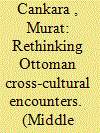

|
|
|
|
|
| Summary/Abstract |
This article aims to show how and why Armeno-Turkish, or Ottoman Turkish written in Armenian letters, especially throughout the nineteenth century, was not merely an Armenian phenomenon but rather a cultural reflection of a larger Ottoman history. The article begins with a critique of the literature on the Ottoman millets and the interaction among them. It then presents examples of Turkish statesmen, authors, and journalists who were either aware of or could read Armeno-Turkish, and explores how Armeno-Turkish might have served as a written lingua franca among the members of different ethnic, religious, and linguistic groups in the Ottoman Empire. Finally, it concludes with a number of reflections on the possible reasons for Turksʼ interest in the Armenian script. The article thus aims to contribute to the debate over the Ottoman millet system from the perspective of cross-cultural exchanges and encounters among the different peoples of the Ottoman Empire.
|
|
|
|
|
|
|
|
|
|
|
|
|
|
|
|
| 7 |
ID:
139128
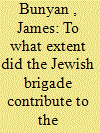

|
|
|
|
|
| Summary/Abstract |
Whilst the desperation of key international Zionist leaders, such as Chaim Weizmann, to field a fighting force against the Nazis consisting entirely of Palestinian Jews is evident in their correspondence, it is difficult to ascertain just how significant the practical contribution of the Jewish Brigade was to the Zionist project. The political effect of activities such as facilitating illegal immigration and, post-war, quietly training Jewish underground forces in Palestine cannot by their very nature be evaluated. Yet perhaps the Brigade's most important contribution to the embryonic state of Israel was the huge leap in political and cultural strength that boasting such a force represented.
|
|
|
|
|
|
|
|
|
|
|
|
|
|
|
|
| 8 |
ID:
139132
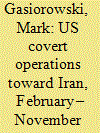

|
|
|
|
|
| Summary/Abstract |
This article examines US covert operations toward Iran from February until November 1979. It focuses especially on whether the CIA was trying to undermine or overthrow Iran's nascent Islamic regime, as many Iranians believed. The article details the extensive covert contacts the CIA and other US personnel established in this period with Iranian officials and various Iranian opposition factions. Its main conclusion is that US officials established these contacts for the purpose of gathering intelligence about the rapidly changing situation in Iran, rather than to undermine the Islamic regime. Indeed, US personnel never encouraged these Iranian contacts to plot against the regime and often explicitly discouraged them from doing so.
|
|
|
|
|
|
|
|
|
|
|
|
|
|
|
|
|
|
|
|
|